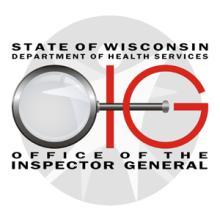Office of the Inspector General (OIG)
The Office of the Inspector General (OIG) protects Wisconsin taxpayers by tracking and preventing fraud, waste, and abuse in public assistance programs administered by DHS, like Medicaid, FoodShare, and Family Care. At the same time, OIG's internal audits protect the accountability of DHS programs and operations.
Established in October 2011, OIG consolidates all program integrity, audit, and fraud investigation activities into one office. Since its beginning, it has saved taxpayers millions of dollars. Staff works closely with other state and local partners to identify misuses of public assistance funds, and where appropriate, forwards fraud cases to federal, state, and local officials for prosecution.
Misuse of public funds affects each person who lives in Wisconsin. We encourage everyone to report suspected fraud, waste, or abuse. Call the fraud hotline at 877-865-3432 or use the fraud reporting website. You may remain anonymous, if you wish.
Understanding fraud, waste, and abuse
Fraud is any intentional act or omission designed to deceive others in order to get undeserved money or other items of value. Examples of fraud include:
- Accepting kickbacks for referring Medicaid patients to a particular provider
- Billing a long-term care program for services that were not provided
- Billing for services for a recipient or provider who is incarcerated or deceased
- Billing inflated hours to an agency providing home healthcare
- Failing to accurately report on applications who and how many people make up a household
- Forging or altering documentation
- Making purchases for personal items that are charged to government programs
- Overstating needs on the Personal Care Screening Tool or Long Term Care Functional Screen
- Receiving benefits in more than one state at a time
- Underreporting income to receive BadgerCare, FoodShare or other benefits
Waste is squandering money or resources, even if it's not actually illegal. Examples of waste include:
- Buying overpriced office equipment from a favorite vendor, instead of obtaining competitive bids
- Flying first-class on business trips rather than traveling in coach
- Putting items like diapers or diabetic supplies on auto-refill, resulting in a member receiving more than needed
- Prescribing name-brand drugs when generics would work as well
- Using taxpayer funding to purchase or lease luxury cars
Abuse is behaving improperly or unreasonably, or misusing your position or authority. Examples of abuse include:
- Using government computers and software for personal use
- Earning personal awards or incentives while spending government funds
- Intentionally using the wrong billing code resulting in a higher payment
- Performing and billing for medically unnecessary services
- Using work time to conduct personal business
Programs and services within OIG
The Medical and Program Audit Review sections focus on preventing, detecting, and investigating provider fraud, waste, and abuse in Wisconsin’s Medicaid program.
Track retailer/recipient fraud
The Fraud Investigation, Recovery, and Enforcement section investigates possible recipient fraud in DHS programs like BadgerCare Plus, Medicaid, and FoodShare, as well as retailer fraud in the WIC program.
Internal auditors objectively investigate and evaluate DHS programs and processes to improve operations, reduce risk, increase efficiency, and provide oversight.
The Data Analytics section collects and analyzes data used by OIG in audits, investigations, and reports monthly statistical results.
OIG staffers work closely with our partners, helping with verifications, collections, and overpayments. They also provide technical auditing and accounting guidance to providers.
Contact OIG
201 E. Washington Ave.
PO Box 7850, Madison, WI 53707-7850
Send an email to: DHSOIGAdmin@dhs.wisconsin.gov
Call us at: 608-266-2521
Join our email list - Sign up to get email notices about fiscal, accounting, and auditing issues of interest to DHS providers, provider associations, counties, tribes, public accounting firms, and other stakeholders.








